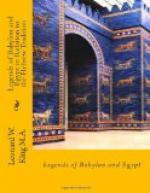The inference we may obviously draw is that the Sumerian narrative continued in existence, in a literary form that closely resembled the original version, into the later historical periods. In this there would be nothing to surprise us, when we recall the careful preservation and study of ancient Sumerian religious texts by the later Semitic priesthood of the country. Each ancient cult-centre in Babylonia continued to cling to its own local traditions, and the Sumerian desire for their preservation, which was inherited by their Semitic guardians, was in great measure unaffected by political occurrences elsewhere. Hence it was that Ashur-bani-pal, when forming his library at Nineveh, was able to draw upon so rich a store of the more ancient literary texts of Babylonia. The Sumerian Version of the Deluge and of Antediluvian history may well have survived in a less epitomized form than that in which we have recovered it; and, like other ancient texts, it was probably provided with a Semitic translation. Indeed its literary study and reproduction may have continued without interruption in Babylon itself. But even if Sumerian tradition died out in the capital under the influence of the Babylonian priesthood, its re-introduction may well have taken place in Neo-Babylonian times. Perhaps the antiquarian researches of Nabonidus were characteristic of his period; and in any case the collection of his country’s gods into the capital must have been accompanied by a renewed interest in the more ancient versions of the past with which their cults were peculiarly associated. In the extant summary from Berossus we may possibly see evidence of a subsequent attempt to combine with these more ancient traditions the continued religious dominance of Marduk and of Babylon.
Our conclusion, that the Sumerian form of the tradition did not die out, leaves the question as to the periods during which Babylonian influence may have acted upon Hebrew tradition in great measure unaffected; and we may therefore postpone its further consideration to the next lecture. To-day the only question that remains to be considered concerns the effect of our new evidence upon the wider problem of Deluge stories as a whole. What light does it throw on the general character of Deluge stories and their suggested Egyptian origin?
One thing that strikes me forcibly in reading this early text is the complete absence of any trace or indication of astrological motif. It is true that Ziusudu sacrifices to the Sun-god; but the episode is inherent in the story, the appearance of the Sun after the storm following the natural sequence of events and furnishing assurance to the king of his eventual survival. To identify the worshipper with his god and to transfer Ziusudu’s material craft to the heavens is surely without justification from the simple narrative. We have here no prototype of Ra sailing the heavenly ocean. And the destructive flood itself is not only of an equally material and mundane character, but is in complete harmony with its Babylonian setting.




